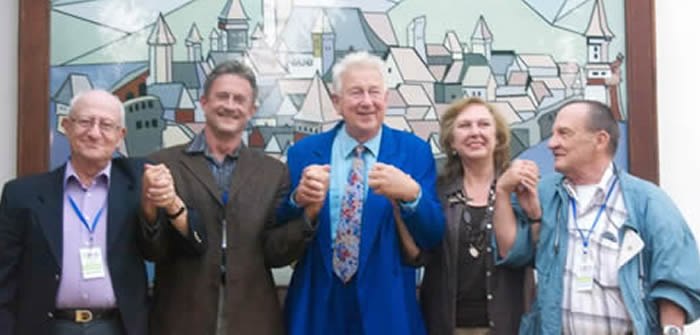Tucked away in the Transylvanian countryside, Radu Gabrea’s annual festival of Central European films may be small – it was considerably smaller this year than its previous two incarnations– but the passions behind it are manifestly big. (The Medias Central European Film Festival – MeCEFF for short — closed its four-day run at the end of June.) How else to explain its scrappy survival against those devilish odds of fickle funding, political pitfalls, lousy weather and, well, those monstrous, never-dying shadows of economic downturn still haunting most cultural events in this corner of Europe? Talk about vampires.
And just as surely as those creepy creatures are eternal, so it is with film festivals forever dodging the next bullet, or should I say fang? Constant, bloodsucking battles over money and scheduling routinely come with the territory in every niche of the film business, so no surprises there.
What was surprising, however, is the uncanny ability of the 76-year-old Gabrea, along with this wife and business partner, the Romanian actress Victoria Cocias, to tackle all these doorstep demons while in full pre-production mode for his upcoming — what, 15th? – feature film. This one is entitled Lindenfeld by the Romanian writer Ioan T. Morar, and the day after the festival volunteers tossed out the empty bottles of champagne and tsuika and shut the festival doors, Gabrea and Cocias packed up their Dacia and drove five hours across Romania to their home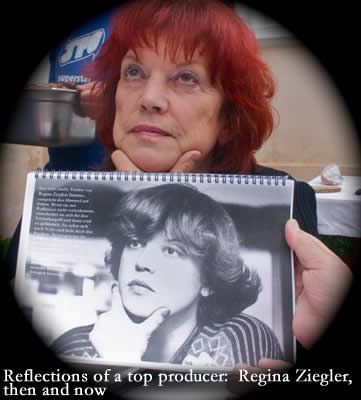 outside of Bucharest, in the village of Petrachioaia, ready to get to work.
outside of Bucharest, in the village of Petrachioaia, ready to get to work.
(Full disclosure: I tagged along in the back seat as their house guest, my offers of financial aid to pay for gas being roundly rebuffed.)
There, after tending to two skinny black cats and a nervous dog clearly jinxed by the strange invader, they set about planning their first day of principal photography. They would need to shoot soon in one of the many nearby sunflower fields — gorgeous and gleaming in its summer prime — before the waves of golden crowns atop their10-foot wands lost all visual magic under the fierce Romanian sun. Coscias, 56, who stars in the film, also set about doing homework for her role as a 75-year-old mother – “a difficult age to play,” she offered, “to capture the walk and mannerisms, and the voice” – after she had served up a tasty lunch of fish and veggies for her husband and guest.
Lindenfeld is a project Gabrea, through his Bucharest-based company Total TV, has been nursing since his first edition of MeCEFF back in 2011, a time when he must have found the chore of fundraising for films a bit tougher than fundraising for film festivals. This year, those roles seemed reversed, and Lindenfeld was on the fast track (or at least as fast as subsidy-funded filmmaking goes). The film centers on a wealthy man who returns after many years to Lindenfeld, the Saxon village of his birth, deciding with his son and biographer to rebuild the deserted town from scratch and market it as an authentic replica.
The story of such an unlikely resurrection seemed appropriate, given that Gabrea’s own life as a festival founder and filmmaker has followed a similar storyline. As of this writing in mid-October, the director 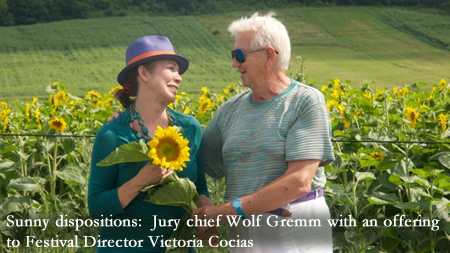 had, against the odds, wrapped production on Lindenfeld and was well into post, expecting to have the film ready for an early 2014 commercial release.
had, against the odds, wrapped production on Lindenfeld and was well into post, expecting to have the film ready for an early 2014 commercial release.
Book-ending this adventure over the past year has been MeCEFF’s nearly serial death-throes in its humble odyssey to four screens of Medias. Usually held in September, Gabrea had to move his gathering to June this year due to uncertainties surrounding the impact of a new film law. Still, he and Cocias hope to move the festival back to its fall slot next years, demons willing.
“We never knew even up until a week before the opening, how much money we had available for the festival,” Gabrea reported. “So we were not able to invite everyone as before or organize all the events and screenings as we had before. But happily we were supported once again by the mayor.” (Medias mayor Teodor Neamtu, another undaunted festival fan).
Yet the town of Medias , whose main industry is the production of natural gas and not cultural artifacts, would hardly seem a likely ally for a tribe of international cineastes. Gabrea’s gamble is to fight against cultural parochialism, and fight it on a very low budget. “I want to help the town and region understand the exceptionally rich film traditions of Romania and Central Europe in the context of some of its greatest practioners – Milos Foreman, Jiri Menzel, Jaromil Jires, Andrzej Wajda, Jerzy Kawalerowicz, , Andrei Miunk, and Istvan Svabo. Etcetera.” 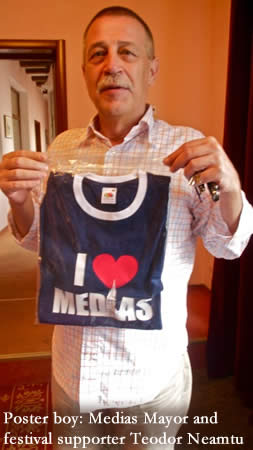
Etcetera indeed. Why would a town of gas producers come out to watch art house cinema or auteurist retrospectives? Or, for that matter, symposia on Jewish filmmaking in a town nearly devoid of Jews since the 1960s, and where the local synagogue (a festival screening venue) hasn’t held a service in over 20 years?
In the answer lies another of Gabrea’s talents. While he’s created a festival that’s certainly elitist by content, it is anything but elitist in attitude. Gabrea and his small staff continue to reach out to students, teachers, and community and regional cultural groups, and with a spirit undaunted by the odds. “Maybe next year we have to have more movies for the young people and the public,” Cocias opined, “but this year was a very high approach, a more educational approach.”
One of the most intriguing art house films screened at the festival, in fact, was Gabrea’s own A Man Like Eva, a 1983 fictional take on the life of German director Rainer Werner Fassbinder. The film’s trick is to featurea woman (actress Eva Mattes) playing the man himself, and with extraordinary verisimilitude. It’s a bit of ingenious counter-casting that adds new layers of complexity to Fassbinder’s tortured bisexuality and chaotic life. Needless to say, the film – part of the festival’s offerings from the “guest country” of Germany – was not programmed to be a crowd pleaser. But the cineastes among us devoured it whole, as we did the screening of Gabrea’s Rosenmil from 1993, a charming Belle Epoque love story with high production values that proved once again how capably Gabrea can stretch penny-pinching budgets, taffy-like, into sweet confections that belie their humble ingredients.
As for Fassbinder, his ghost seemedto haunt MeCEFF this year, as it necessarily would in a festival focusing heavily on the New German Cinema of the the 60s and 70s. Top German producer Regina Ziegler, who took home a Special Jury award closing night for her contributions to German film, joined her husband, the director Wolf Gremm, in sharing with festival audiences her own stories of working with this sad and complicated man. It was Gremm’s 1982 feature, Kamikaze 89, that starred Fassbinder in his final acting role.
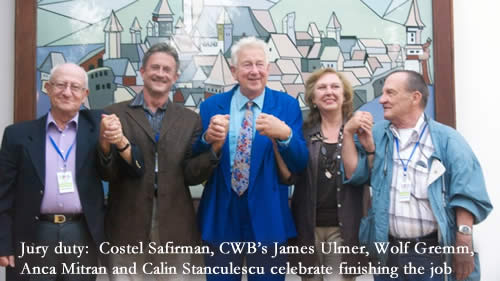 Both Ziegler and Gremm remained good friends of the late director until his death in 1982 from a drug overdose. Gremm’s 1981 documentary The Last Works Rainer Werner Fassbinder is a personal portrait of the director, whom he met a football game while Fassbinder was shooting his monumental Berlin Alexanderplatz.
Both Ziegler and Gremm remained good friends of the late director until his death in 1982 from a drug overdose. Gremm’s 1981 documentary The Last Works Rainer Werner Fassbinder is a personal portrait of the director, whom he met a football game while Fassbinder was shooting his monumental Berlin Alexanderplatz.
“I think anyone who wants to make a statement about Fassbinder’s indefatigable life and about working with him, has to film his life,” said Gremm. “And to do that you must have an ability matching Fassbinder’s: to describe not the people themselves, but what lies in between.”
Like Fassbinder, Ziegler has been one of her country’s major provocative forces in film and TV production since the early 70s when she founded Ziegler Films (she now runs it with her daughter Tanja). In the mid-90s, she jolted audiences with her ground-breaking series of short films for television, Erotic Tales (recently out on DVD), in which she gave some of the world’s leading film directors (among them Wajda, Emir Kusturica, Jiri Menzel, Mirinal Sen, and Bob Rafaelson) carte blanche to interpret the term “erotic” as freely as possible in creating their own half-hour erotic-themed films. One of the results, Susan Seidelman’s Dutch Master, was nominated for an Oscar.
Known equally for her charismatic business appeal and her shrewd eye for talent, Ziegler currently is celebrating the 40th anniversary of her company and was honored this year with a special edition of Germany’s leading cinema arts magazine Kino. Nested among her 400 movies, television documentaries and series is a shelf-load of civic and film industry honors. Among them are the Prix Europa Lifetime Achievement Award in 2012; the American Cinema Foundation’s Freedom Award; and Germany’s Federal Cross of Merit (not to mention last year’s curiously titled “Best Female Human Brand” — whatever that means). In 2006 the Museum of Modern Art in New York honored her with a retrospective of her career. 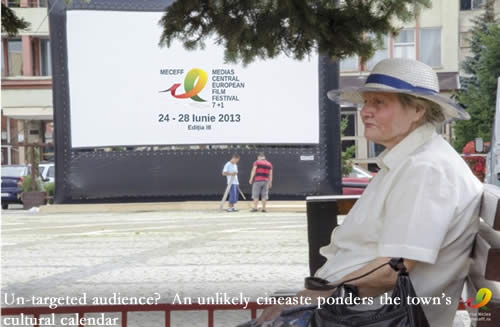
As for Gremm, the self-proclaimed cancer survivor was an inspiration to all for his ownspecial way of dispensing good humor and cheer despite the rough times. Throughout the four-day festival he and Ziegler frequently mixed tales of their careers with generous dollops of laughter, lively conversation and, for Gremm, requent recitations of his favorite bit of home-grown career advice: “Follow your dreams, even if it’s only for fun.”
When I first met Ziegler some 25 years ago during my days at The Hollywood Reporter, she was famous across Europe for her bevy of colorful hats, and though she has since doffed that habit, Gremm seems to have inherited her penchant for colorful accouterments. His candy-colored outfitsseemed to change on a semi-daily basis; for the closing ceremonies he donned an electric-blue suit and kaleidoscopic tie. It all seemed testament to his own determination to seize the moment and “celebrate each day that we are lucky enough to be alive.” It just fit his personality.
Speaking of vibrant, MeCEFF’s competition films this year were unexpectedly strong. (Another disclosure: I was invited this year to serve on the competition jury, which included the 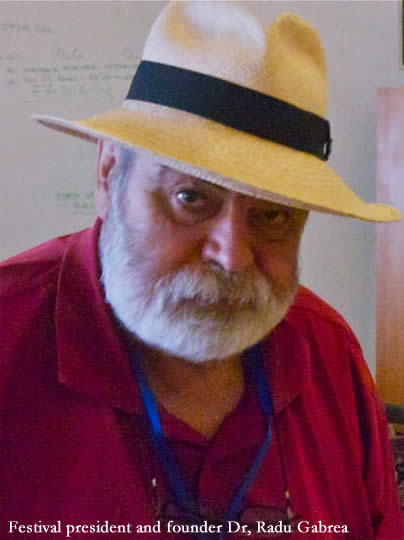 Gremm as jury president; Romanian National Film Archive director Anca Mitran; film critic and historian Costel Safirman; and Romanian journalist and author Calin Stanculescu). Especially notable, I thought, were Marco Naberŝnik’s Shanghai Gypsy (Slovenia) and Agnieszka Holland’s In Darkness (Poland). Other entries included Breathing from Austria, Four Suns from the Czech Republic, Of Snails and Men from Romania, and The Exam from Hungary.
Gremm as jury president; Romanian National Film Archive director Anca Mitran; film critic and historian Costel Safirman; and Romanian journalist and author Calin Stanculescu). Especially notable, I thought, were Marco Naberŝnik’s Shanghai Gypsy (Slovenia) and Agnieszka Holland’s In Darkness (Poland). Other entries included Breathing from Austria, Four Suns from the Czech Republic, Of Snails and Men from Romania, and The Exam from Hungary.
A two-hour confab on the final, rainy day of the festival (weather was another demon MeCEFF had to wrestle) resulted in some lively exchanges on film art and philosophy, and a final vote that honored my personal favorite, Shanghai Gypsy, with best film. We gave In Darkness the best director and best cinematography award, after which Gabrea delivered a traditional bottle of champagne to the jury table as our own reward for a job (presumably) well done. Toasts were made, rather raucously, all around.
As for the audience award? Not surprisingly, it went to Romania’s own popular comedy Of Snails and Men from directorTudor Giurgiu, himself one of the directors of the considerably larger Transylvanian International Film Festival over in the slightly more sophisticated city of Cluj. It seems that even in the somewhat parochial corners of Central Europe, commercial fare can happily coexist with the elitist, as long as good taste, tenacity and a penchant for bucking the odds can join together to let great films thrive – and festivals survive to live another day.

